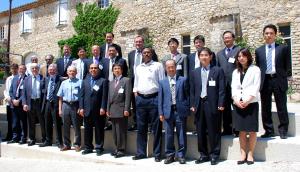Path forward for Test Blanket Modules program

This week, the third meeting of the Test Blanket Modules (TBM) Program Committee (PC) took place at the Cadarache Château. The Committee is charged with the governance of the TBM program and it serves as an advisory committee for the ITER Council on this matter. It is formed from one governmental representative of each ITER Member and up to three experts per Member coming from the various national laboratories and universities involved in breeding blanket R&D and in the TBM Program.
In its third meeting, the Committee addressed several TBM-related topics and made appropriate recommendations to the ITER Council. The first topic was the assessment and the endorsement of the recommendations made at a workshop held mid-April on the TBM impact on ITER plasma physics and potential countermeasures. The recommendations are for the TBM designers to minimize the amount of ferromagnetic steel used in the TBM and to be ready to replace the TBMs during the ITER high-performance deuterium-tritium phase if negative effects on the ITER plasma performance are observed.
The second topic was the sharing principle to be applied to the additional ITER Organization cost related to the TBM Program. In agreement with a similar recommendation made by the Management Advisory Committee (MAC) last week, the TBM-PC recommended the application of the sharing principle used for the construction phase of ITER.
The TBM-PC noted the good technical progress performed by the teams and the plan for future work presented by the Members. Progress reports are presented at almost every PC meeting by the teams in order to allow the Committee to monitor them and to take corrective actions in case they are not satisfactory.
Additional topics addressed were the aspects of intellectual properties rights related to the TBM Program and the schedule proposed by the ITER Organization for achieving the signature of the Arrangements that will commit the six TBM Leaders to delivering the corresponding Test Blanket Systems on time for their planned installation in ITER. The TBM Arrangements are similar in many ways to the ITER Procurement Arrangements, but present several specific features since they refer to systems that are fully under the responsibility of the TBM teams—from the technical specifications to the delivery—and for which no other commitment exists.
Finally, the Committee reviewed the performed ITER Organization activities on the TBM Program and the corresponding future short-term work plan.
